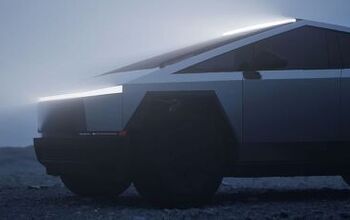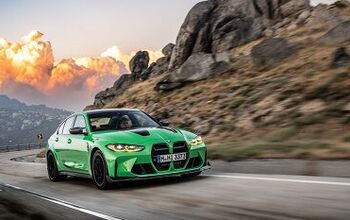Great Wall's Descent A Sign Local Industry Not Ready For Primetime
Once the darling of investors amid ambitions of taking on foreign automakers such as Jeep with its line of SUVs, Great Wall Motors’ recent fall from grace on the back of the upscale Haval H8 may be a sign Chinese automakers are not yet ready to move from production of cheap transportation.
Bloomberg reports production of the 200,000 yuan ($32,100 USD) SUV, aimed at the likes of the Volkswagen Tiguan and Ford Kuga, was suspended indefinitely earlier this month amid quality concerns regarding “knocking noises” from the six-speed automatic transmission at high speeds. The second delay of the H8 — the first occurring earlier this year after local press panned the SUV in test drives — sent Great Wall’s stock price down 17 percent, while seven analysts cut their ratings of the automaker due to perceived weaknesses in the overall local industry from the suspension. Oriental Patron Financial Group analyst Vivien Chen, one of the seven, explains:
We believe the event indicates domestic automakers haven’t met requirements to upgrade to be a high-end vehicle maker. The event definitely hurt customers’ perception of H8, and hurt company image.
The suspension is the latest stumbling block for Great Wall, having faced a recall with Chery of 23,000 units from Australia in 2012 when banned asbestos parts were found in some models. In addition, 2013 exports fell 22 percent to nearly 75,000 units due to currency challenges in Japan and South Korea. Locally, the automaker is faring better, having moved almost 112,000 SUVs over its competitors so far in 2014, though the market overall fell 2.5 percent in April to 37.1 percent for local automakers, the eight consecutive month this has occurred.
Despite the setbacks, Macquarie Group analyst Janet Lewis believes Great Wall and the rest of the Chinese automakers may be able to learn from the experience as they move forward toward selling their wares to developed markets such as the United States, though they all still have a long road ahead of them, as Sanford C. Bernstein analyst Max Warburton points out with Great Wall:
The company faces monumental challenges in trying to move up a league in the automotive world, and the problems faced by the H8 confirm Great Wall is struggling with technology. Serious questions will now be asked about Great Wall’s growth potential.
Seattle-based writer, blogger, and photographer for many a publication. Born in Louisville. Raised in Kansas. Where I lay my head is home.
More by Cameron Aubernon
Latest Car Reviews
Read moreLatest Product Reviews
Read moreRecent Comments
- 28-Cars-Later This question has been posed many times and we discussed it in depth around the time of the ATS and JdN. Then GM had 933 dealers left over from its glory days and ATS was intended to be volume lease fodder for all of those dealer customers. But of course the problem there is channel stuffed junk worked against the image they ostensibly were trying to create when they threatened products like Escala (and the image they thought they were creating with ELR). Cadillac had two choices in my view at the time, either drop 2/3rds of the dealers and focus on truly bespoke low volume product or abandon the pretense of exclusive/bespoke and build high volume models as they had essentially been doing since the last 1960s. Ten years on the choice they made was obvious, hence XT everything... XT an acronym for Xerox This when pointing at Chevrolets and Buicks.There's no "saving" a marque which doesn't wish to be saved. In the next major financial crisis Buick may be folded or consolidated into Chevrolet but Cadiwrack will just become a wrapper over whatever Chinesium infused junk the new openly owner/controlled SAIC GM wants it to be. Cadillac been gone for a long, long time.
- Kjhkjlhkjhkljh kljhjkhjklhkjh you cant. the younger buyers do not want Cadillac's .. Older buyers want toyotas, lexus and of all things subarus ... all in SUV form
- Billccm Accepting that they can't compete with Hyundai and Kia opens that door for increasing market share for the Korean cars. I need to find a few more grand marquis and figure out the best way to store them as I'm not surrendering to a cute yute of F150 for my daily.
- Slavuta That car that they sell for $80K... Sell it for $50K
- NJRide I miss GM offering sedans.I don't miss a plasticky, uninspiring one not changed much from Obama's second term. As I have said before, the A-Bodies may have been an epoch but they had a certain charm to them. These have screamed rental class from Day 1 and have a third-world level engine.Sedans died because they got too cramped and too derivative. Especially the Big 3's offerings. The fact that there was no real move back to them when gas was $5 in 2022 shows this to be true. Then again the Trailblazer/Trax are hatches not SUVs. Non-identifying wagons and hatches along with on-road crossovers will be the "cars" of the upcoming era.


































Comments
Join the conversation
The asbestos is being replaced with the lead they used to use in toy paint and the sulfur they used to put in drywall. It will instead be used as a substitute for melamine in infant formula.
Until they have a uniform rule of law, fixing one company or one industry isn't going to make it work out. Every judge is a feudal lord, and unless the council of kings is angered enough to off him, his word is law. We can hate on government regulation, but it's total absence is a bit of a challenge, especially if your competitors are less ethical than you are.